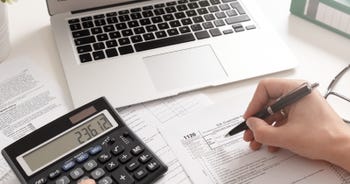A guide to business bankruptcy
Owning a business is not always easy, and many small businesses may find themselves struggling financially from time to time, particularly in the early days.
Unfortunately, financial problems can escalate quickly, and this is where it is useful to know about bankruptcy and insolvency laws in the UK, even if you may never actually declare bankruptcy for your company.
Due to the coronavirus crisis, UK insolvency laws have been temporarily relaxed to allow businesses to carry on trading while undergoing rescue or restructuring processes. However, this is liable to change at any moment, so it is important to keep up to date with the latest government announcements.
What’s the difference between bankruptcy and insolvency?
You may well have heard words such as ‘bankruptcy’, ‘liquidation’ and ‘insolvency’ used to describe businesses that are no longer operational. But these words have different meanings, and it is important that you understand exactly what those are.
Bankruptcy and insolvency, for example, are actually two different things, although they may also be two parts of the same process.
A company goes into insolvency - or is declared insolvent - when it can no longer afford to pay its debts and does not own enough assets to cover them.
But what is bankruptcy? Well, declaring bankruptcy is the process through which you or your company accepts that you cannot pay your debts and asks for all or some of them to be written off.
In the UK, a business that you run as a sole trader or as a partnership can be declared bankrupt - but a limited company, technically, cannot. Instead, limited companies would enter a liquidation process that ends in the company being ‘wound up’.
Are there different types of business bankruptcies?
There are a number of different types of business bankruptcy or insolvency in the UK. Although some of these are not called bankruptcy, they amount to the same thing in that they will result in the closure of your business.
If you are a sole trader, you may be forced to apply for personal bankruptcy. Under this arrangement, your business and personal possessions might be sold to pay back some of your debts. Following personal bankruptcy, it is often difficult or impossible to continue to be self-employed.
Voluntary bankruptcy, which can apply to either an individual or a business, is when an insolvent debtor (person or company who owes money) declares themselves bankrupt at a court. It differs from an involuntary bankruptcy whereby creditors have to make the application to try to recoup some of the debts.
These are different again from voluntary agreements, which include Company Voluntary Arrangements (CVAs). These are deals struck by a business to pay back creditors over time. They may also involve your business stopping trading, but are not bankruptcies.
How does business bankruptcy work in the UK?
Business bankruptcy in the UK is known as insolvency and it can be a lengthy process. If you reach the end of the bankruptcy process, your company will no longer exist. However, this process can be stopped at various stages if you find ways to pay your debts or reach an agreement with creditors.
First of all, an insolvency practitioner (also known as an administrator) will be appointed to take over the running of your business and oversee its liquidation.
The administrator will settle any outstanding contracts or legal disputes, and then sell any assets the company owes. Any funds raised from asset sales will be used to pay people or companies who are owed money, settle your final VAT bill, and pay the cost of liquidation.
Although the process can be stopped at various stages, once it is complete your company will be liquidated and can no longer trade.
Can you cancel a winding up order?
A winding up order is a court order that forces an insolvent company into liquidation. It is normally ordered by creditors or HMRC.
Winding up orders can be stopped, but you have only a small window in which to do this. In fact, you must apply to cancel the order within five working days of it being made.
You may be allowed to cancel the order if you were unable to attend the original hearing at which the order was given, or if you can provide evidence that your company can pay its debts.
What happens if you declare bankruptcy as a sole trader or partnership?
If you operate as a sole trader, you may be asking yourself ‘what happens if I declare bankruptcy’? Declaring bankruptcy in the UK as a sole trader means your business and personal debts will be written off and you will no longer be made to pay them.
But your business or personal assets may still be sold to creditors, so they can at least get some of their money back. It may also be difficult for you to start another company or continue to be self-employed.
For partnerships, declaring bankruptcy tends to mean each partner declares personal bankruptcy for themselves. The partnership’s debt will be written off, but the individual partners could be liable for them.
Can bailiffs claim personal assets to recover business debts?
If your business is registered as a limited company in the UK, then the short answer is no, bailiffs cannot take personal assets to pay off business debts.
However, for sole traders or partnerships, there is a potential threat to personal assets if your business goes bankrupt. That’s because, under these arrangements, you may be personally liable for your business debts.
Bailiffs could come to your home to value - and later sell - your personal possessions. However, they are not entitled to do so on their first visit, and there are only certain items that can be claimed by bailiffs to pay back creditors. That’s why it is vital to know your rights and to get good, impartial bankruptcy advice as early as possible in the bankruptcy process.
What happens if you liquidate a limited company?
Liquidating or winding up your limited company is the process through which it stops operating. What this means in practice is that the company will not be able to do business or employ people.
The company is then removed, or ‘struck off’, from the Companies House register. After this, any remaining assets are used to pay off debts, with anything left over going to shareholders.
A company may choose to liquidate itself if it no longer wants to continue operating - and indeed, it does not have to have gone bankrupt or be insolvent.
Compulsory strike offs in the UK, however, are a type of liquidation that is initiated by a third party. This is usually a process started by Companies House in the UK, because - for example - the company has failed to file its annual accounts.
Are company directors liable for the debt of a limited company?
Although there are some exceptions, typically a company director is not liable to repay debts of a limited company. Even if your company finds itself going bankrupt with no assets, creditors cannot ask company directors to sell personal possessions to pay debts.
There are a few exceptions to this rule, however. You may, for example, be personally liable as a director if you have fallen behind on PAYE payments to your employees or on National Insurance contributions, or if you owe income tax on money taken out of the company.
Can bailiffs claim assets from a limited company?
Bailiffs can take most possessions owned by a limited company. This can include cash, stock, office equipment or machinery. However, they can only take things that belong to the company outright, not that belong to employees, directors or that have been leased.
What to do if your business is in financial difficulty
If your business is in financial difficulty, the best thing to do is seek impartial financial advice.
When it comes to the prospect of insolvency or even liquidation, you should familiarise yourself with your bankruptcy options, understand what bankruptcy means, and know how to declare bankruptcy in the UK.
Better understanding the implications of bankruptcy and the details of the bankruptcy process will help you make decisions if you find yourself in financial trouble.








